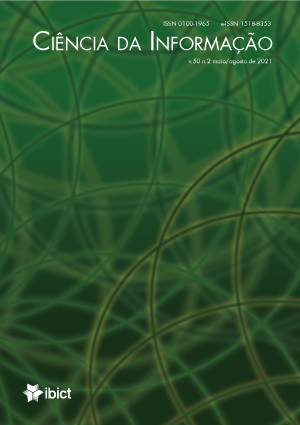El Conocimiento y la innovación en el contexto del Programa de Emprendedores Competitivos: un análisis del aumento de la competitividad del grupo Marília Top Moda
DOI:
https://doi.org/10.18225/ci.inf.v50i2.5232Palabras clave:
Conocimiento, Competitividad, Innovación, Organizaciones minoristasResumen
El entorno del comercio minorista se inserta en un entorno extremadamente competitivo y la generación de
innovaciones ya no es un diferencial y se ha convertido en una herramienta importante para incrementar
la competitividad. En esta perspectiva, la Asociación Comercial e Industrial de Marília (ACIM) en alianza
con SEBRAE implementó el programa Empreender, cuyo propósito es brindar mayor competitividad a las
empresas participantes. El objetivo de esta investigación fue analizar el programa Empreender en el contexto
del uso del conocimiento en la construcción colectiva de innovaciones y en el aumento de la competitividad de
las empresas que participan en el grupo Marília Top Moda. Para ello, se utilizó el método de estudio de caso,
aplicando la estrategia de triangulación, para hacer más consistente la investigación y validar los datos y los
análisis realizados. Como resultado, presenta un modelo de gestión del conocimiento para mejorar el proceso
de innovación hacia el incremento de la competitividad en las empresas participantes en Marília Top Moda.
Descargas
Referencias
BOISOT, M. Knowledge assets: securing competitive advantage in the information economy. New York: Oxford University Press, 1998. 286 p.
BUKOWITZ, W. R.; WILLIAMS, R. L. Manual de gestão do conhecimento: ferramentas e técnicas que criam valor para a empresa. São Paulo: Bookman, 2002.
CACB. Empreender. Brasília, 2020. Disponível em: https://cacb.org.br/empreender/. Acesso em: 15 abr. 2020.
CHOO, C. W. The knowing organization: how organizations use information to construct meaning, create knowledge and make decisions. New York: Oxford University Press, 1998. 425 p.
DAVENPORT, T H.; PRUSAK, L. Working knowledge: how organizations manage what they know. Boston: Harvard Business School Press, 1998, 203 p.
FREEMAN, C.; SOETE, L. A economia da inovação industrial. Campinas: Editora Unicamp, 2008.
GIL, A. C. Métodos e técnicas de pesquisa social. 5. ed. São Paulo: Atlas, 1999.
IBGE. As Micro e pequenas empresas comerciais e de serviços no Brasil: 2001. Rio de Janeiro: IBGE, 2003. Disponível em: https://www.ibge.gov.br/estatisticas/economicas/outras-estatisticas-economicas/9123-as-micro-e-pequenas-empresas-comerciais-e-de-servicos-no-brasil.html. Acesso em: 10 abr. 2020.
JORGE, C. F. B. Análise de fatores críticos na gestão do conhecimento e no processo de Inteligência em organizações complexas: uma análise teórico prática em múltiplas organizações. 2017. 511 f. Tese (Doutorado em Ciência da Informação) - Faculdade de Filosofia e Ciências, Universidade Estadual Paulista, Marília, 2017. Disponível em: https://repositorio.unesp.br/bitstream/handle/11449/152376/jorge_cfb_dr_mar.pdf?sequence=3. Acesso em: 18 abr. 2020.
JORGE, C. F. B.; VALENTIM, M. L. P.; SUTTON, M. J. Redes de conhecimento como estratégia de inovação na industrial alimentícia: um estudo de caso na Danilla Foods. Informação & Sociedade: Estudos, [S. l.], v. 30, n. 2, 2020. DOI: 10.22478/ufpb.1809-4783.2020v30n2.52248. Disponível em: https://periodicos.ufpb.br/ojs/index.php/ies/article/view/52248. Acesso em: 15 ago. 2021.
JORGE, C. F. B.; FALÉCO, L. L. A aplicação da Gestão do Conhecimento como estratégia de competitividade organizacional. Brazilian Journal of Information Science: research trends, [S. l.], v. 10, n. 3, 2016. DOI: 10.36311/1981-1640.2016.v10n3.08.p69. Disponível em: https://revistas.marilia.unesp.br/index.php/bjis/article/view/5992. Acesso em: 14 ago. 2021.
JORGE, C. F. B.; VALENTIM, M. L. P.; A importância do mapeamento das redes de conhecimento para a gestão da informação e do conhecimento em ambientes esportivos: um estudo de caso no Marília Atlético. Perspectivas em Ciência da Informação, [S. l.], v. 21, n. 1, p. 152-172, mar. 2016. ISSN 19815344. Disponível em: http://portaldeperiodicos.eci.ufmg.br/index.php/pci/article/view/2533/1707. Acesso em: 13 ago. 2021.
JORGE, C. F. B. et al. Complexity and knowledge in organisational context: concepts, approaches, boundaries and relations. Journal of Information & Knowledge Management, [S. l.], v. 20, n. 4, 2021. DOI: 10.1142/S0219649221500416. Disponível em: https://www.worldscientific.com/doi/10.1142/S0219649221500416. Acesso em: 01 set. 2021.
MARCONE, M. A.; LAKATOS, E. M. Fundamentos de metodologia científica. 5. ed. São Paulo: Atlas, 2003.
MORAES, C. R. B. de; FADEL, B. Ambiência organizacional, gestão da informação e tecnologia. In: VALENTIM, M. L.P. (Org.). Informação, conhecimento e inteligência organizacional. 2. ed. Marília: FUNDEPE Editora, 2007. p. 99-114.
MYTELKA, L.K. Competition, innovation and competitiveness: a framework for analysis. In: MYTELKA, L.K. (ed.). Competition, innovation and competitiveness in developing countries. Paris: OECD, 1999.
MUÑOZ-SECA, B.; RIVEROLA, J. Transformando conhecimento em resultados: a gestão do conhecimento como diferencial na busca de mais produtividade e competitividade para a empresa. Tradução de Carlos Racca. São Paulo: Clio, 2004.
NONAKA, I.; TAKEUCHI, H. The knowledge-creating company: how japanese companies create the dynamics of innovation. New York: Oxford University Press, 1995, 299 p.
SCHUMPETER, J. A. Teoria do desenvolvimento econômico. São Paulo: Abril Cultural, 1982.
SEBRAE. Quem Somos. Brasília, 2020. Disponível em: https://www.sebrae.com.br/sites/PortalSebrae/canais_adicionais/conheca_quemsomos. Acesso em: 3 abr. 2020.
TIDD, J.; BESSANT, J.; PAVITT, K. Gestão da Inovação. 3. ed. Porto Alegre: Bookman, 2005.
WIIG, K. Knowledge sense of the organization: Thinking about thinking. How people and organizations create, represent and use knowledge. Arlington, TX: Schema Press, 1993. 475 p.
YIN, R. K. Estudo de caso: planejamento e métodos. 2. ed. São Paulo: Bookman, 2003.
Descargas
Publicado
Número
Sección
Licencia
Derechos de autor 2021 Carlos Francisco Bitencourt Jorge, Maria Alice Campagnoli Otre, Bruno Bastos de Oliveira

Esta obra está bajo una licencia internacional Creative Commons Atribución-CompartirIgual 4.0.
- La publicación se reserva el direcho de realizar, en los originales, cambios de orden normativa, ortográfica y gramatical, para mantener la norma culta del idioma, respetando el estilo de los autores;
- Las pruebas finales no seran enviadas a los autores;
- Los trabajos publicados pasan a ser propriedad de la revista Ciência da Informação, siendo su reimpresión total o parcial, sujeta a autorización expresa de la dirección del IBICT;
- Debe ser consignada la fuente de publicação original;
- Són de exclusiva responsabilidad de los autores las opiniones emitidas en sus artículos;
- Cada autor recibirá dos ejemplares de la revista, caso esté disponible en el formato impreso.




























